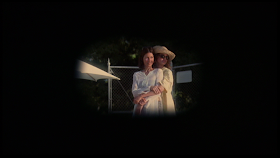The next entry in the 2000 race comes from the work given by a respected British actress, and one who has found occasional success in American films and has been appreciated by audiences and critics alike. I, personally, have only previously seen her as the loving mother in the Harry Potter films, but I now offer you the acclamied, accomplished work of....
...Julie Walters in Billy Elliot (2000)
.
.
Julie Walters plays Mrs.Wilkinson, a hardworking, British dancing instructor who's eye catches that of young Billy Elliot (Jamie Bell, giving a confident, emotionally rich performance in the title role).
Mrs. Wilkinson is a woman who teaches ballet to a group of young girls with her strong motto of tough-love, and at the same gym Billy is forced into boxing by his brute of a father, but discovers his love of dancing ballet from Wilkinson's class.
In the character's early scenes we get to see what this lady is all about and how she demands hardwork and concentration from her students. It's these traits and expectations which makes Billy stand out to her; she sees that he has a talent for it, but he needs the proper guidance and training, which is something she can provide.
Things get messy when Billy's family won't allow him to pursue his dream and continually put him down for even considering such a thing -- and this is where Mrs. Wilkinson's character really gets a jump start.
Understanding Billy and his situation, she offers him secret dancing lessons, and the two begin a sort of camaraderie as two people who share the same passion.
Walters' performance in the film is very nearly one of it's most essential aspects, and in many ways elevates it. Her approach to the role is bold, but surprisingly disarming. From early on we can clearly see what kind of person Mrs. Wilkinson is, yet as her bond with Billy tightens, she is still the same person, but Walters allows her to be a kind, compassionate being under the tough persona. There's a certain something about Billy which sparks off something inside her, either its the whiff of talent, maternal nurturing, or good old kindness and Walters lets us see this mix, and she stirs it all which just the right feeling.
She strikes the right balance of compassion and strength, and conveys pockets of surprising verve and levity in addition to maintaining a subtle humor throughout, all of which without losing sight of the core of the character and withought letting her slip into sentimentality.
As the narrative complicates, Walters holds a steady beat for the character which lets us see her own personal problems of how she never made it big (and the result of it) as well as witnessing Billy's emotional struggle, and she also demonstartes how she truly, genuinely cares about this boy and how she wants him to soar and make his dreams come true...the dreams that never came true for her.
The rapport between Walters and Bell is both touching and real because both actors understand that the challenges and hurdles one must go through in life and the price one must pay to go above and beyond.
While the film itself is rather uneven, it is kept afloat thanks to these two great performances (Bell should have totally of gotten a nom, and even a win wouldn't be out of the question), but I find it a bit frustrating that the script doesn't really give Mrs.Wilkinson a final finish, but instead leaves the character hanging as if they forgot about her at the very end. Thankfully, though, this doesn't hurt Walters' performance at all, but I do still wish we were filled in on a bit more.
In the end, I find myself both equally impressed and moved by Julie Waters' performance and shocked at the lack of admiration for it as well, because its really solid, and suprisingly shaded work by an interesting actress who's nomination to me is clearly a worthy one.

























































